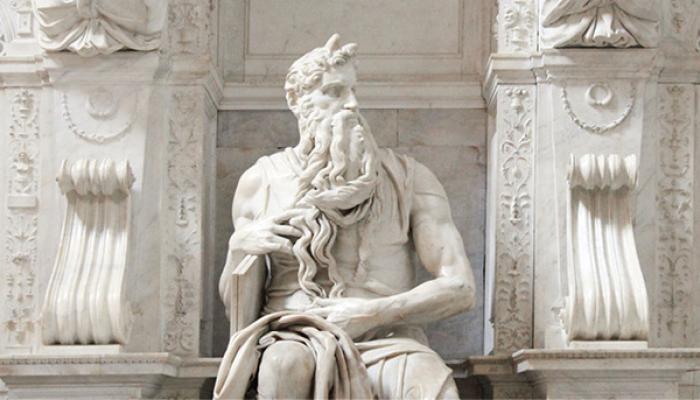
1.22 Warum fand die Sintflut in der Zeit von Noah statt?
Das Buch Genesis sagt uns, dass Gott viele Jahre nach dem Fall von Adam und Eva erneut von den Menschen enttäuscht wurde, die sich bösartig und sündig verhalten haben. Es tat ihm leid, dass er sie erschaffen hatte und wollte sie in einer großen Flut zerstören. Nur Noah benahm sich gut. Gott sagte ihm, er solle eine Arche bauen, um seine Familie unterzubringen, sowie ein Männchen und ein Weibchen aller Tierarten der Welt (Gen 6,13-19)Gen 6,13-19: Da sprach Gott zu Noach: Ich sehe, das Ende aller Wesen aus Fleisch ist gekommen; denn durch sie ist die Erde voller Gewalttat. Siehe, ich will sie zugleich mit der Erde verderben. Mach dir eine Arche aus Goferholz! Statte sie mit Kammern aus und dichte sie innen und außen mit Pech ab! So sollst du sie machen: Dreihundert Ellen lang, fünfzig Ellen breit und dreißig Ellen hoch soll sie sein. Mach der Arche ein Dach und hebe es genau um eine Elle nach oben an! Den Eingang der Arche bring an der Seite an! Richte ein unteres, ein zweites und ein drittes Stockwerk ein! Ich bin es. Siehe, ich will die Flut, das Wasser, über die Erde bringen, um alle Wesen aus Fleisch unter dem Himmel, alles, was Lebensgeist in sich hat, zu verderben. Alles auf Erden soll den Tod finden. Mit dir aber richte ich meinen Bund auf. Geh in die Arche, du, deine Söhne, deine Frau und die Frauen deiner Söhne! Von allem, was lebt, von allen Wesen aus Fleisch, führe je zwei in die Arche, damit sie mit dir am Leben bleiben; je ein Männchen und ein Weibchen sollen es sein..
Nachdem die Flut die Erde bedeckt hatte, schwamm Noahs Arche auf einem riesigen Meer. Nach 150 Tagen begann das Wasser abzunehmen. Gott hat mit allen Menschen einen Bund geschlossen: Er würde niemals wieder zulassen, dass die Erde überflutet wird. Der Regenbogen ist ein Zeichen dieses Versprechens (Gen 9,16)Gen 9,16: Steht der Bogen in den Wolken, so werde ich auf ihn sehen und des ewigen Bundes gedenken zwischen Gott und allen lebenden Wesen, allen Wesen aus Fleisch auf der Erde..
What are the first stages of God's Revelation?
From the very beginning, God manifested himself to our first parents, Adam and Eve, and invited them to intimate communion with himself. After their fall, he did not cease his revelation to them but promised salvation for all their descendants. After the flood, he made a covenant with Noah, a covenant between himself and all living beings. [CCCC 7]
How does God reveal himself in the Old Testament?
God shows himself in the Old Testament as God, who created the world out of love and remains faithful to men even when they have fallen away from him into sin.
God makes it possible to experience him in history: with Noah he establishes a covenant to save all living things. He calls Abraham so as to make him “the father of a multitude of nations” (Gen 17:5b) and to bless “all the families of the earth” in him (Gen 12:3b). The people Israel, sprung from Abraham, becomes his special possession. To Moses he introduces himself by name. This mysterious name Yhwh, usually transcribed Yahweh, means “I am who I am” (Ex 3:14). He frees Israel from slavery in Egypt, establishes a covenant with them on Sinai, and through Moses gives them the law. Again and again, God sends prophets to his people to call them to conversion and to the renewal of the covenant. The prophets proclaim that God will establish a new and everlasting covenant, which will bring about a radical renewal and definitive redemption. This covenant will be open to all human beings. [Youcat 8]
Down the various ages of history men have continued to commit sins, perhaps even greater than those described before the flood. However, from the words of the covenant God made with Noah we realize that now there is no sin that can bring God to destroy the world he himself created. [Pope John Paul II, Homily, 16 Feb. 1997]





